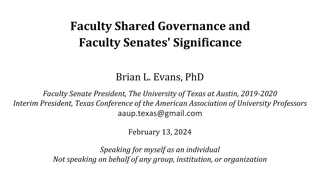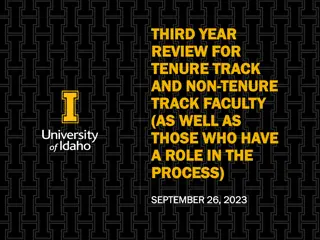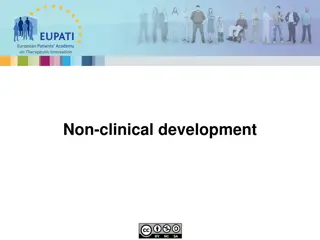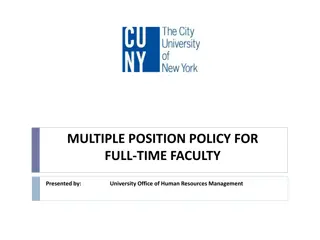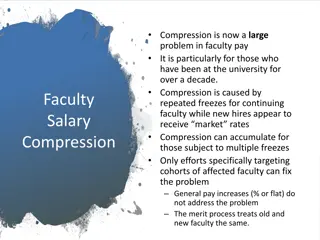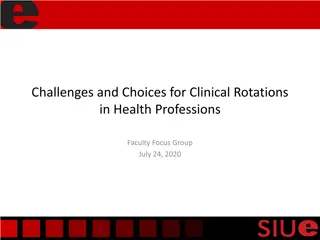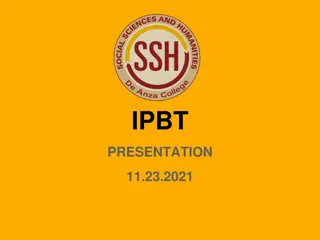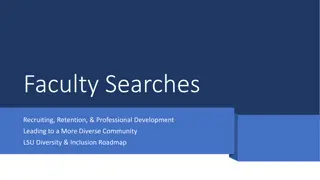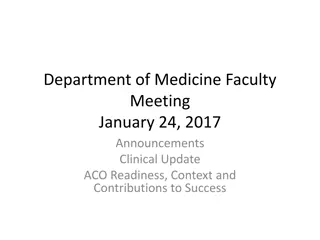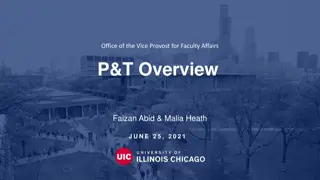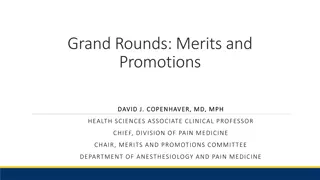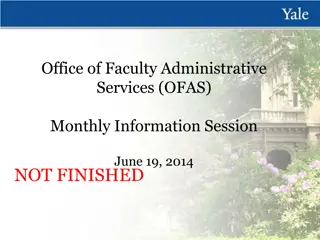Welcome as a USCSOMG Clinical Faculty Member
"As a member of the USCSOMG Clinical Faculty, you will have access to training content covering Canvas, the online learning management system, and OASIS, an online scheduling and assessment application. Learn about the M3 and M4 years, assessment competencies, and criteria for evaluation. Explore the responsibilities for both faculty and students along with important policies. Dive into the mission, vision, and values of the USC School of Medicine Greenville, focusing on innovative teaching and healthcare transformation. Discover the integrated approach to medical education emphasizing professionalism, lifestyle medicine, and behavioral sciences. Meet the key individuals in the Office of Education responsible for shaping the educational experience. Get an overview of Canvas and OASIS usage for student resources and scheduling."
Download Presentation

Please find below an Image/Link to download the presentation.
The content on the website is provided AS IS for your information and personal use only. It may not be sold, licensed, or shared on other websites without obtaining consent from the author.If you encounter any issues during the download, it is possible that the publisher has removed the file from their server.
You are allowed to download the files provided on this website for personal or commercial use, subject to the condition that they are used lawfully. All files are the property of their respective owners.
The content on the website is provided AS IS for your information and personal use only. It may not be sold, licensed, or shared on other websites without obtaining consent from the author.
E N D
Presentation Transcript
Welcome as a USCSOMG Clinical Faculty Member Michael Wiederman, PhD Director of Professional Development
Training Content A Little About the USC School of Medicine Greenville Introduction to Canvas, online learning management system and OASIS, online scheduling and assessment application. Brief Overviews of M3 and M4 Years Assessment Competencies Criteria for Evaluation Responsibilities: Yours and the Students Policies and other important information
A New School of Thought Our Mission Heal compassionately. Teach innovatively. Improve constantly. Our Vision Transform healthcare for the benefit of the people and communities we serve. Our Values Together we serve with integrity, respect, trust and openness.
A New School of Thought Early and ongoing immersion into the practice of medicine: EMT Certification and Training Integrated basic science and clinical learning and practice Graduated continuum of clinical responsibility Ongoing, monthly shifts as EMTs Teaching rounds in the clinics and hospitals Small group, student-centered, interprofessional learning environment In addition to the traditional basic medical and clinical sciences, our school weaves three other pillars through all four years of the curriculum: *Professionalism, *Lifestyle Medicine, and *Behavioral, Social and Population Health Sciences.
A New School of Thought Office of Education Associate Dean for Education Lynn Crespo, PhD Assistant Dean for Clinical Clerkship Education April Buchanan, MD Assistant Dean for Longitudinal Clinical Education Tom Blackwell, MD Senior Clerkship Coordinator: Anne Green Buckner Longitudinal Academic Coordinator: Caroline Blouin
Overview of Canvas USCSOM Greenville uses the Canvas Learning Management System (LMS) for the administration of all student educational resources. You will receive an email with your Canvas login information and instructions. For more information about using Canvas: http://guides.instructure.com/ m/4210
Overview of OASIS USCSOM Greenville uses OASIS, online application, for clerkship and residency scheduling, rotations, and assessment You will receive an email with your OASIS login instructions A 5-minute video tutorial is available: https://youtu.be/E2RCT42CrnQ?list=PLQ- bjRN9PBDUphJGAauNUpOVLkZJdLwV0
M3 Core Clerkships Internal Medicine Family Medicine Pediatrics Obstetrics and Gynecology Surgery Psychiatry and Neurology
M4 34 week curriculum 1 week of NRMP Match, Advising, EPIC training, Practice Step 2 CK 7 blocks (4 weeks each) Required AI, Required ICU or ED, other rotations as recommended for residency 12 weeks of electives 5 week intensification block right after match for residency prep
M3/M4 What you need to do: Become familiar with the objectives for the M3 clerkship or M3/M4 elective in which you teach Decide what you want to post on your elective Canvas page readings, instructions, etc. Evaluate students at the end of the clerkship and/or elective (in OASIS) Sign off on patient encounter entries in OASIS
Method of Student Assessment M3 Core Clerkships Evaluation of Student Performance isn OASIS by Faculty and Residents (50% of summative grade) NBME Shelf Exam (25% of summative grade, 30% in Psych/Neuro) End of rotation OSCE (25% of summative grade, 20% in Psych/Neuro)
Attendance Policy Students are allowed a maximum of 3 excused absences in a 7-week clerkship Beyond 3, the student must make up days missed Students are allowed 1 excused absence in a 2-week elective
Duty Hours Maximum of 80 hours per week 1 day in 7 free from all educational and clinical responsibilities (averaged over the clerkship) 24 hours max + 4 additional hours to finish work and participate in didactic activities Infractions must be reported Clerkship Director, Faculty, and Chair must make sure duty hours are not exceeded
Assessment for M3 and M4 Competencies Patient Care Knowledge for Practice Practice-Based Learning and Improvement Interpersonal and Communication Skills Professionalism Systems-Based Practice Interprofessional Collaboration
Assessment for M3 and M4 Competencies Patient Care: Provide patient-centered care that is compassionate, appropriate, and effective for the treatment of health problems and the promotion of health Obtains accurate comprehensive or focused history appropriate to the presenting problem Performs comprehensive or focused physical examination appropriate for the presenting problem Performs and interprets diagnostic and screening tests with an understanding of their indications and limitations. Develops reasoned differential diagnoses of patients clinical problems Applies clinical problem solving skills to develop integrated therapeutic plans for the acute and longitudinal management of health problems
Assessment for M3 and M4 Competencies Knowledge for Practice: Demonstrate knowledge of established and evolving biomedical, clinical, epidemiological and social-behavioral sciences, as well as the application of this knowledge to patient care Integrates medical knowledge from basic and clinical science disciplines for the development of a diagnosis, management, and prevention of disease Demonstrates understanding of genetic, environmental, psychological, socioeconomic, cultural and spiritual factors that influence human health and disease.
Assessment for M3 and M4 Competencies Practice-Based Learning and Improvement: Demonstrate the ability to investigate and evaluate one s care of patients, to appraise and assimilate scientific evidence, and to continuously improve patient care based on constant self- evaluation and life-long learning Recognizes personal limitations, actively seeks help and advice as appropriate, and modifies behavior in response to feedback. Takes initiative and incorporates evidence-based guidelines for clinical problem-solving and improved patient care.
Assessment for M3 and M4 Competencies Interpersonal and Communication Skills: Demonstrate interpersonal and communication skills that result in the effective exchange of information and collaboration with patients, their families, and health professionals Performs accurate, fluent, case presentations Completes well-organized, written documentation Communicates well with patients and families Communicates effectively with members of the healthcare team
Assessment for M3 and M4 Competencies Professionalism: Demonstrate a commitment to carrying out professional responsibilities and an adherence to ethical principles Displays professional virtues and behaviors, including honesty, empathy, integrity, respect, dependability, and responsibility Provides compassionate care regardless of disease, prognosis, race, color, sex, age, ethnicity, religion, sexual orientation, disability, socioeconomic or cultural or health- related beliefs
Assessment for M3 and M4 Competencies Interprofessional Collaboration: Demonstrate the ability to engage in an interprofessional team in a manner that optimizes safe, effective patient- and population-centered care Takes responsibility for patient care appropriate for his/her level of training to ensure safe, timely, efficient, equitable, and patient-centered care Works effectively as a team member with health care providers including those from other disciplines to assess, coordinate, and improve patient care
Assessment for M3 and M4 Anchors used in evaluations A Exceptional: Truly Outstanding. Far exceeds expectations B+ Above Expectations: Above the level of peers B Meets Expectations: At expected level C+ Meets Expectations Most of the Time but Has a Few Areas of Deficiency C Scattered and Important Deficiencies that Need Further Monitoring but Does Not Meet Criteria for Failure F Unacceptable
Assessment for M3 and M4 Narrative Comments Summative Evaluation (REQUIRED) Comment on specific attributes that characterize this student s performance. When possible, please relate specific instances that form the basis of your comments. This section is VERY important and will be included in Medical Student Performance Evaluation/ Dean s Letter. Recommendations for Improvement -- Please be as specific as possible and provide specific instances that form the basis of your comments. This information is given to the student but is not included in MSPE/ Dean s Letter.
M3/M4 Student Encounters/logs Sign off on student encounters/logs in OASIS Understand that if a student fails to achieve experiences, remediation will be required
Policies and Other Important Information
LCME Accreditation Standard on Student Mistreatment MS-32 - A medical education program must define and publicize the standards of conduct for the faculty-student relationship and develop written policies for addressing violations of those standards. Secretariat Comments - A school's compliance with this standard is thoroughly reviewed on all surveys because survey teams and the LCME take the issue of student mistreatment very seriously.
Student Mistreatment Guidelines for Conduct in Teacher/Learner Relationships (Student Handbook http://greenvillemed.sc.edu/StuAff_Handbook.shtml and the Faculty Handbook http://greenvillemed.sc.edu/Faculty_Handbook.shtml) Identifies responsibility of teachers and learners Describes inappropriate and unacceptable behaviors as those which demonstrate disrespect for others or lack of professionalism in interpersonal conduct Retaliation for reporting mistreatment is unacceptable and is not tolerated. The School s Ombudsman is empowered to receive and investigate reports of mistreatment in a confidential manner, to mediate, and to make recommendations Online form for reporting mistreatment
Reporting Professionalism Concerns or Commendations Can be reported on student evaluation Can be reported directly to the Clerkship Director or Assistant Dean for Clinical Clerkship Education
The Role of the Student Evaluations and Promotion Committee (SEPC) Biomedical and Clinical Science Faculty Makes recommendations to the Dean regarding student s continued enrollment and/or academic progress Reviews professionalism concerns regularly
Questions abuchanan@ghs.org Assistant Dean for Clinical Clerkship Education April Buchanan, MD










